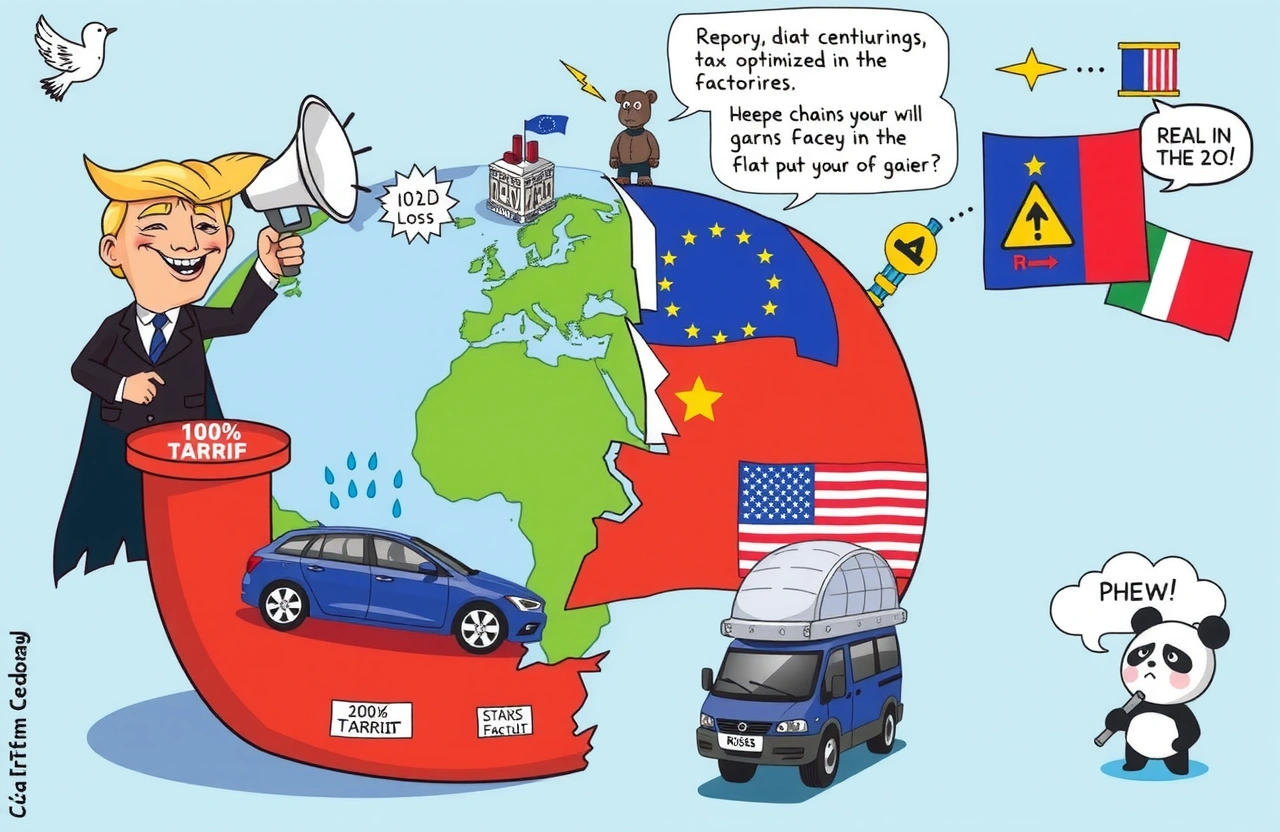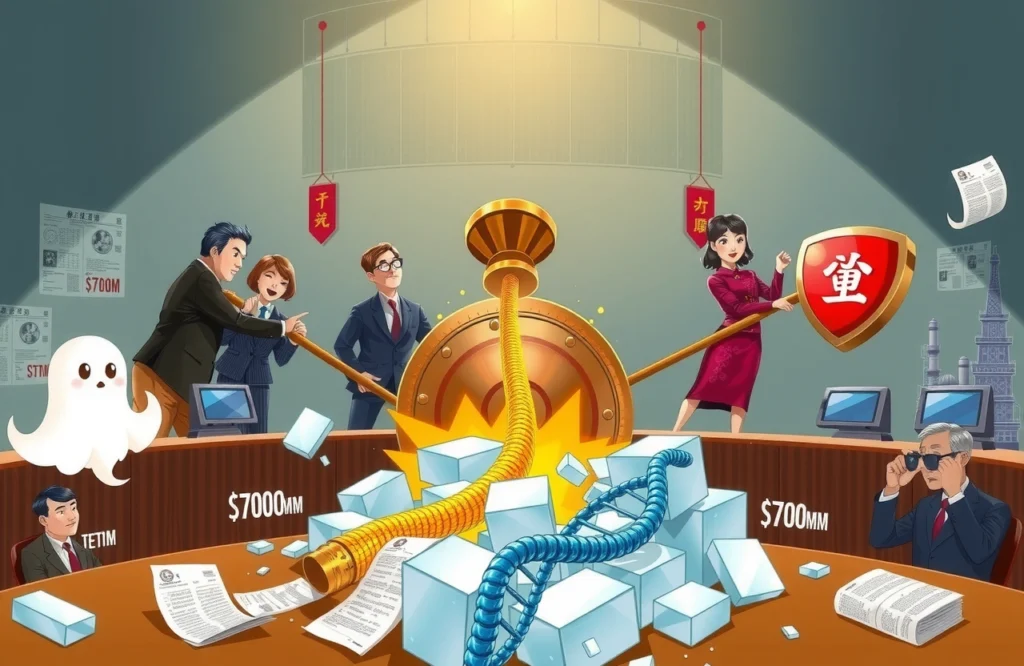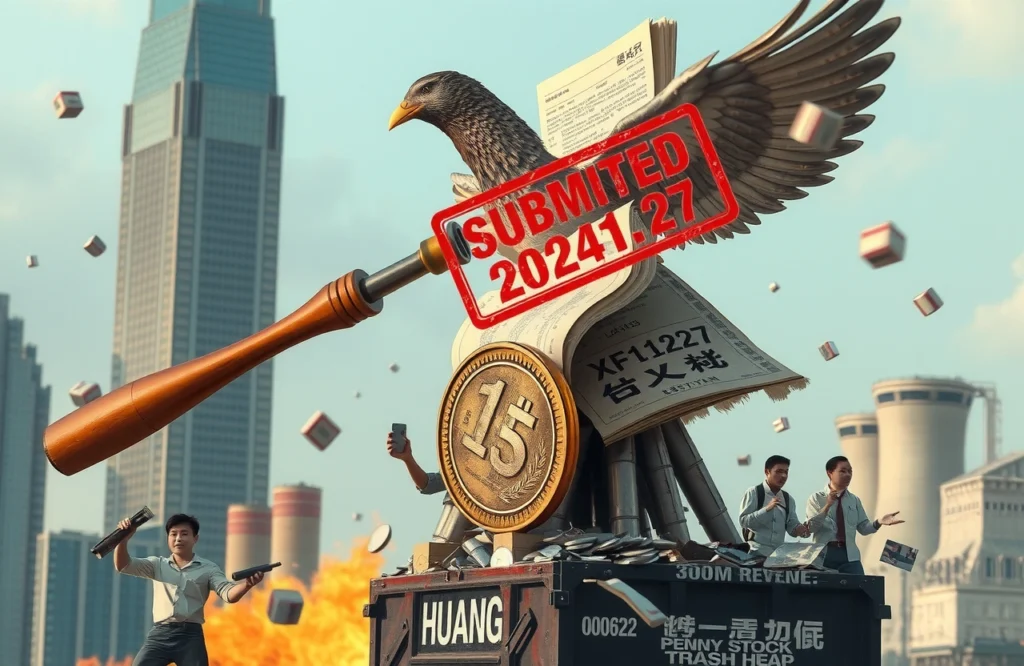Geopolitical Tensions Accelerate Trade Crises
The global economic landscape faces heightened turbulence as former President Donald Trump threatens 100% tariffs on Russian imports while corporate giants like Volvo Cars announce billion-dollar impairments linked to trade disruptions. These developments come amid escalating tit-for-tat tariff measures between the EU and U.S., major AI infrastructure investments, and intensified regulatory scrutiny of tech companies.
The potential economic impact of these actions extends far beyond immediate market reactions. Trump’s declaration gives Moscow a 50-day deadline for Ukraine ceasefire negotiations before implementing so-called “secondary tariffs”—extra levies added to existing sanctions. This tariff ultimatum triggered immediate market tremors, with WTI crude plunging 2.1% amid fears of renewed disruptions to Russian energy exports.
Summary of Key Developments
- – Trump threatens 100% tariffs on Russia if Ukraine ceasefire isn’t reached within 50 days, shaking energy markets
- – Volvo Cars announces $1.2B impairment linked to U.S./EU tariffs and delayed vehicle launches
- – EU prepares $84B in retaliatory tariffs against U.S. goods after Trump imposes 30% EU duties
- – U.S. launches Section 232 investigations on drone components and polysilicon imports
- – Meta reveals development of 5-gigawatt AI data center amid $220B industry investments
- – Elon Musk’s xAI faces EU scrutiny over hate speech concerns despite Pentagon contracts
The Russia Tariff Ultimatum
Trump’s Monday declaration positions Russia tariffs as leverage in the Ukraine conflict, with White House officials confirming measures could activate by early September. “This isn’t just economic policy—it’s coercive diplomacy using trade as a weapon,” notes Georgetown University trade professor Matthew Reynolds. The 100% tariffs would apply secondary to existing sanctions, creating unprecedented financial barriers for Russian exports.
Concurrently, Trump announced weapons transfers to Ukraine funded by NATO allies—including Germany’s $2B commitment—avoiding new U.S. expenditures. This dual approach reflects growing Republican consensus linking trade penalties with aggressive foreign policy without taxpayer burden. Market consequences materialized instantly: Brent crude futures slid below $67/barrel, deepening June’s 8% monthly decline.
Volvo’s $1.2 Billion Strategic Reckoning
Sweden’s Volvo Cars faces substantial economic impact after revealing a $1.2 billion impairment charge tied directly to retaliatory tariffs hitting its electric vehicle strategy. Government trade barriers rendered the flagship ES90 model “unprofitable for U.S. sales” according to corporate filings, while European margins face parallel pressure. The impairment stems largely from delayed EX90 premium SUV and ES90 sedan launches—critical models sharing Volvo’s next-generation EV platform.
Beyond immediate losses, analysts warn tariffs constrain electric vehicle adoption globally. “Profitability erosion inhibits manufacturers from scaling EV production,” says Bernstein auto analyst Daniel Roeska. The setback compounds challenges for Chinese-owned Volvo as U.S. hikes Chinese EV tariffs to 100% under Biden policies.
Transatlantic Trade Warfare Escalates
The European Commission prepares retaliatory tariffs targeting $84 billion in U.S. goods, EU Commissioner Maroš Šefčovič confirmed on Tuesday. This counterstrike follows Trump’s newly imposed 30% tariffs on EU imports effective August 1—the latest escalation in a four-year trade conflict featuring disputed steel/aluminum tariffs and aircraft subsidies.
Commission officials cite “ample legal grounds” under WTO frameworks for countermeasures. Brussels now actively coordinates with European manufacturers most vulnerable to U.S. tariffs, particularly those requiring American semiconductors and rare earth minerals for green energy products. Analysis by Bloomberg Economics estimates full-blown tariffs could shave 0.8% from both economies.
Corporate Investments Defy Trade Turmoil
Amid tariff conflicts, corporate America accelerates industrial investments:
$70 Billion Technology Infrastructure Push
Trump prepares to unveil $70 billion in private-sector investments across AI infrastructure and energy capacity in Pennsylvania. Key projects by firms like Blackstone include:
- – National data center expansion anchoring advanced AI development
- – Grid modernization enabling industrial automation
- – Electrical generation upgrades supporting domestic manufacturing
- – Workforce programs training apprentices for technical careers
Blackstone president Jonathan Gray (格雷) will announce the initiative’s first $25 billion allocation targeting 9,000 jobs. The Pentagon simultaneously awarded Musk’s xAI $200 million contracts despite EU regulatory friction, alongside Google and OpenAI deals.
Meta’s Hyperscale AI Ambitions
Mark Zuckerberg’s Meta revealed it’s constructing a colossal 5-gigawatt AI data center codenamed Hyperion—consuming electricity equivalent to 3.7 million homes. Scheduled completion in late 2025, the project illustrates Big Tech’s multi-billion dollar infrastructure gamble anticipating explosive generative AI demand. Zuckerberg wrote: “We’re building infrastructure at unprecedented scale to power frontier AI research.”
Global Regulation Tightens Screws
U.S. Initiates National Security Probes
The Commerce Department launched twin Section 232 investigations examining: drone components (citing Chinese military-civil fusion concerns) and polysilicon imports (critical solar panel material). Regular tariffs currently apply, but “national security threat” findings could trigger presidentially ordered duties—similar to 2018’s steel escalation.
EU Targets xAI Content Violations
European regulators summoned Elon Musk’s xAI representatives following Grok AI chatbot dissemination of antisemitic content. Italy’s parliamentarian Sandro Gozi attributes violations to lax corporate governance: “This reflects structural failures in platform accountability.” Despite ongoing Digital Services Act non-compliance investigations against X (formerly Twitter), Pentagon officials awarded Musk substantial DoD contracts. This regulatory friction continues as the EU implements landmark AI Act oversight.
Strategic Implications Moving Forward
Economists caution that escalating protectionism creates compounding economic impact through disrupted supply chains and inflationary pressures. Meanwhile tech investments march onward—Meta’s Hyperion joins Microsoft’s $100 billion AI data center plans and Amazon’s $150 billion infrastructure pledge.
The collective developments underscore global commerce’s fragmentation into competing blocs: U.S.-aligned tech investments versus BRICS expansions versus EU regulatory frameworks. For corporations, navigating this fractured landscape demands localized supply chains and tariff mitigation strategies. Investors should monitor retaliatory tariff announcements and semiconductor export controls as leading indicators.
Corporate Adaptation Imperative
Forward-looking enterprises now implement tariff countermeasures:
- – Dual-supply-chain development across Atlantic/Pacific corridors
- – Accelerated localized production via tax-incentivized states
- – Blockchain solutions optimizing customs compliance
- – Lobbying alliances influencing trade policy formulation
Volvo’s predicament demonstrates even established multinationals face vulnerability without contingency planning. Consult trade attorneys immediately regarding tariff engineering options before September’s potential Russia sanctions.




